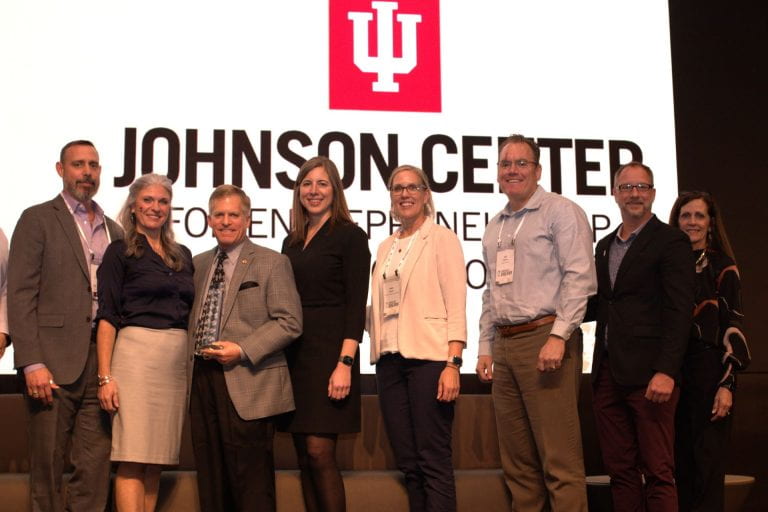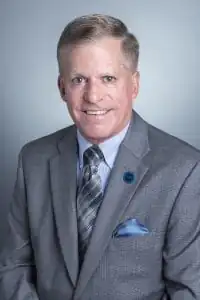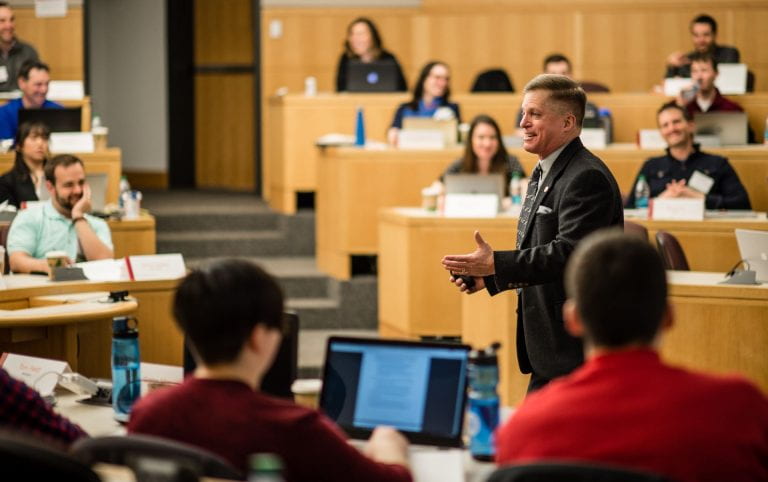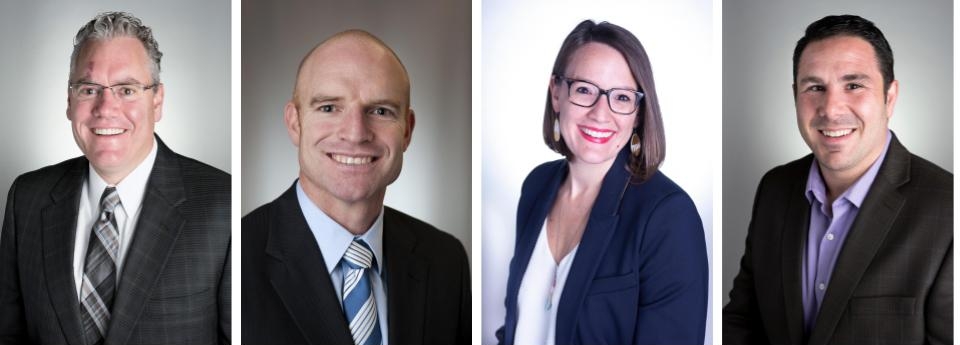
Donald F. Kuratko, third from left, accepts the 2023 Model Entrepreneurship Program Award on behalf of the Indiana University Kelley School of Business in January. The award was announced as part of the USASBE 2023: Driven By Dreams annual conference. Pictured from left are Dennis Barber, awards committee co-chair; Julienne Shields, president and CEO of USASBE; Donald F. Kuratko, Sara Cochran, Susan Batchelder and Jeff McMullen, all from Kelley School; Thomas Pittz, USASBE board chair; and Judi Eyles, awards committee co-chair.
Donald F. Kuratko, regarded as one of the pioneers in the academic discipline of entrepreneurship, points to two big highlights in a career spanning nearly four decades.
The first, writing the first textbook in the field 35 years ago and getting laughed out of publisher meetings. There simply was no “entrepreneurship” field to sell it to, the publishers told him. He finally got one to bite, and the 12th edition of “Entrepreneurship: Theory, Process, and Practice” will come out this fall. It has been translated into five languages and used in business school classrooms around the world.
“It kind of sums up my whole story: I was an early bird in the field with a book that I thought was great, but nobody believed in,” says Kuratko, the Jack M. Gill Distinguished Chair of Entrepreneurship at Indiana University’s Kelley School of Business.
The second, was coming to Indiana University in 2004 to build out and lead Kelley’s Johnson Center for Entrepreneurship and Innovation. For years, he’d been told that he could never go to a Big 10 school because they didn’t care about entrepreneurship. Big brand business schools only cared about the Fortune 500.
“To come here and build a program that we’ve built with the faculty that we have now is the highlight of my career,” Kuratko tells Poets&Quants. “Without question.”
A MODEL PROGRAM FOR ENTREPRENEURSHIP
Perhaps, now, Kuratko can add a third highlight to his list of career milestones. Last month, the U.S. Association for Small Business and Entrepreneurship awarded the Kelley School its prestigious 2023 Model Entrepreneurship Program Award. The honor is given to the institution with the most comprehensive, high-quality educational program that successfully trains future generations of entrepreneurs.
“Indiana is an example that other institutions can look to for how to authentically build their own world-class programs,” says Julienne Shields, president and CEO of USASBE. “It is not just what Indiana University built but also how they built it that is compelling as the top model program.”

Donald F. Kuratko
Ash Soni, interim dean of the Kelley School and the Sungkyunkwan Professor, says the award confirms that the school is home to one of the finest entrepreneurship programs in the world.
“The Kelley School’s comprehensive entrepreneurship curriculum spans across all degree levels and even beyond the business school, thanks to innovative partnerships with several schools across campus as well as a customizable certificate in entrepreneurship available to all students at IU,” Soni says in a release. “Combine that with a stellar faculty who are leaders in entrepreneurial research, and it’s easy to see how Kelley makes an impact.”
GOOD HOUSEKEEPING’S SEAL OF APPROVAL
Under Kuratko’s leadership, the Johnson Center launched several cross-campus initiatives with IU’s Maurer School of Law, the College of Arts and Sciences, the Jacobs School of Music and the Luddy School of Informatics, Computing and Engineering. It also is home to the Entrepreneurial Innovation Academy for Kelley MBA students and the annual Clapp IDEA Competition and Velocity Conference. Kuratko – known to many as “Dr. K” – personally lobbied university deans to create a pioneering entrepreneurship certificate available to students across the IU campus.
Kuratko is also the 2022 winner of the Max S. Wortman/USASBE Lifetime Achievement Award for Entrepreneurship, the USASBE’s highest individual honor. He categorizes the association as the leading entrepreneurship organization in the world, and the recognition highlights the quality and dedication of the entrepreneurship faculty and team.
“I think an award like this is sort of like the Good Housekeeping Seal of Approval. It says to incoming students that if you’re interested in the idea of an entrepreneurial mindset, or being innovative even in organizations, this is the school for you,” says Kuratko. “We’ve made entrepreneurship one of the pillars of our university, and certainly at the Kelley School of Business. This puts a stamp that says not only did we think we’re good, but now the world thinks we’re good.”
Poets&Quants got to speak with Dr. K, one of the fathers of the field, about the award, the entrepreneurship program at Kelley, and the innovations he’ll be watching in the next chapter of his career. Our conversation has been edited for length and clarity.
Thirty-nine years ago, when you were choosing an academic discipline, what about entrepreneurship made you think it was worth studying and teaching?
I grew up in Chicago in a family business. My brother and I had been trying a couple of ventures which we struggled with mightily. So, I was going to go back to get an MBA for my first graduate degree. And as I did, I was learning everything about the Fortune 500 companies with these great case studies. I asked a lot of the professors, “How come we’re not talking about smaller firms and startups?” They just looked at me like I was a quack, “We don’t do that business school.” I thought that was just silly.
So then I remember asking, “What if I ever wanted to develop a course for students like me that were interested in smaller ventures?” They said I’d need to get my doctorate, and so I said, “Okay.” Then it became a bit of a passion, kind of like you set out to prove people wrong.
Coming out of a family business, my own personal experience is what drove me. A lot of students say to me, “Wow, how does it feel to be a pioneer with a field that grew so big?” I never dreamed it was going to grow this big. I was simply trying to develop a course or two for students like me that would be meaningful. That was it. That’s how I started. And now, of course, it’s blossomed into this powerful area, which has been a joy to watch.
What have you seen in the field’s evolution, particularly in the last couple of decades?
I think that when the field started out, it was just about starting a new business. Over the decades, this idea of an entrepreneurial mindset has permeated other fields. That’s why we have corporate entrepreneurship, social entrepreneurship, and so on. Even organizations are saying they want their people to be more entrepreneurial and innovative. I think because of that, the field has just exponentially expanded. If it had just stayed about starting businesses, I think it would have been good, but not to the extent it is today.

Donald F. Kuratko, the Jack M. Gill Distinguished Chair of Entrepreneurship at Indiana University’s Kelley School of Business, is known as Dr. K by many Kelley students. Courtesy photo
You came to Kelley School of Business in 2004. Did you come specifically to start the Johnson Center for Entrepreneurship and Innovation?
Dick Johnson, who it was named after, had just put the money up and they established this Johnson Center, but I don’t think they were certain what they were going to do. So I was recruited by Indiana. Like I said, it was a marriage made in heaven.
My first question was, “Will you let me build a program? I mean, can I hire other faculty?” They said, “Whatever it takes.” And I said, “I like that entrepreneurial thinking.”
I was excited from day one, and I hope you can tell that 19 years later, I’m still excited.
Explain the essential pillars of the Johnson Center and how it shapes the entrepreneurial ecosystem at Indiana University.
I think that I came with a different vision in mind. Most entrepreneurship centers were looked at as outreach centers to the community, and I didn’t want to do that. If we were going to be something that had great respect among other universities, we had to build an academic program, and we had to build it with great researchers in the field that are setting the trends for the new curriculum and areas of research. A lot of people said I was going to fail, and my answer back was, “Well, if I do, then I’ll fail with my own ideas.”
So that’s what we built. It was nicknamed an inreach center: We would reach into our Kelley School of Business, then we would reach into the campus as a whole and try to inculcate education in the entrepreneurial world. We established the entrepreneurship major, then a minor. We established it at the undergrad level, then the MBA level, then the PhD level.
A funny story is that I was visiting with the Jacobs School of Music, and I was asking the students why they were not taking the minor because they seem to have an interest in some of this entrepreneurial thinking. The students said it was too many hours. The minor is only 18 hours, which is six courses, but the Kelley School has prerequisites for them. I knew we had a problem: I could try and get the prerequisites dropped, but that would mean fighting with every department in the school.
Instead, I created a cross-campus, customized certificate in entrepreneurship, where students would take three courses at the Kelley School in entrepreneurship along with two courses from their own schools in the discipline that they love. I don’t care if it’s music, art, engineering, whatever, but the course has to have some innovative content to it. Those five courses would give them this cross-campus certificate that would appear on their transcripts, so it’s every bit as valuable as a minor.
So the funny story behind it is that when I proposed the certificate to the Kelley School, they were balking a little bit. They finally agreed, but said that it would fail at the university level because certificates have to be 18 to 21 credit hours. They said I’d never get away with a 15-hour certificate.
So, I made appointments with the deans from each of the schools and colleges on the decision committee and told them my vision for the certificate. They all loved it. And I said, “Would you put that in writing that you would support this?” I put all their letters into the proposal packet that went to the committee, which meant every member of that committee would have to vote against their dean if they voted no. So, unanimously, my certificate passed.
That’s quite an innovation in and of itself. When was the certificate approved?
Probably in 2010, so about 13 years ago. Over time, I was contacted by a lot of universities asking me how to set it up, and I’m happy to share with them. But, we were probably one of the first to do something like that.
Well, tell us a bit about the faculty that you were able to bring to the Kelley entrepreneurship program.
Right now we have about 10 research faculty, and I have four additional clinical lecture and practitioner faculty. So we have a full faculty of 14 which is very large for an entrepreneurship program.
As to some of the key players on the team, one is Dr. Jeff McMullen. Jeff is the editor in chief of the Journal of Business Venturing, which is the No. 1 academic journal in the field of entrepreneurship. He has tremendous respect across the globe, world renowned in his research, and a phenomenal guy.
Another is Dr. Greg Fisher, who’s a superstar on the rise. Not only in the research that he does, but he’s won every teaching award at the Kelley School. On top of that, he does executive seminars, and they love him as well. It’s very rare to have a professor that’s a top researcher in the world, who can also work with executives and then win teaching awards at the MBA. All of our MBA awards go to Greg.
Sophie Bacq is a rising star in the field of social entrepreneurship and considered one of the leading authorities in the world today because of her research. She’s a dynamo in the classroom; students just love her. And Dr. Regan Stevenson is really, like Greg, that whole package: One of the top young researchers in the field and a great teacher in the classroom.
That’s the other thing that we take great pride in. It’s one thing to have great researchers, but at some schools, you never want to put them in a class. Jeff, Greg, Sophie and Regan are just the opposite; They’re exactly what students just yearn for. So we really have the magic touch, I think, with our team.

From left: Jeff McMullen, Greg Fisher, Sophie Bacq, and Regan Stevenson
What are some aspects in the research that are most exciting to you?
Jeff McMullen really works in the area of entrepreneurial decision making, and some of the things that he’s coming up with are truly unique. I think they’re gonna help entrepreneurs understand how decisions really should be made at various levels of their organization. I think that’s groundbreaking.
Greg Fischer, and I’ve worked with him on this, came up with a concept called entrepreneurial hustle. We were trying to break down the entrepreneurial mindset, and we came up with this idea of entrepreneurial hustle – the urgent and unorthodox actions taken by an entrepreneur to overcome immediate barriers. We did a lot of research on this by listening to the stories of successful entrepreneurs. We built out the concept and developed a scale on measuring hustle which we’re hopefully going to get published.
Those are just a couple of examples of the kind of research that is truly emerging out of our faculty. I think our research is on the leading edge, pushing boundaries, and trying to advance the field.
The USASBE picked Kelley School as having the ‘model’ entrepreneurship program. What do you think they mean by that?
I think they really want to honor a program that is something that other schools can look to and try to emulate. I was asked by the judging panel if I believed other schools could simply look at Kelley’s program and copy it because of how comprehensive it is. I said no, because it took us years to develop the program. But, if you look at the different pieces – whether it’s the cross-campus certificate, or the minor, or the PhD – schools could emulate those and then build from there.
Tell me about the moment you’d found out that you’d won.
Luckily, we had some of our team join us. Jeff McMullen, who was on sabbatical, traveled in for it, and Regan Stevenson was there. I said if we win, I’m gonna go crazy and you’re all going to come up on stage with me.
So when they announced the award, I jumped up and I said, “Come on!” They all were going, “No. No. You go up.” But I said it’s a team award, and so we all went up. It was really exciting. Just one of those highs you get, and it felt really great.
A year earlier, the association awarded you its highest individual honor, the 2022 Max S. Wortman/USASBE Lifetime Achievement Award for Entrepreneurship. How does this compare?
I felt like the Lifetime Achievement Award was gratifying to me, as someone who tried to make an impact on the field. But this award this year meant even more because it was a team award. It was a reflection of our whole program, and everything we’ve built over all these years. Don’t get me wrong, I was very proud of the lifetime award and it was great to receive it, but this year was just special because it was shared with the team. And still today everybody’s buzzing around the school about it.
I’m very blessed because while I get to lead this, it’s really my faculty and the team that has made all this happen. I’m just kind of like the conductor. They’re the ones that really did the work, and I’m very proud of them. I’ve been getting a lot of upfront praise, but it really belongs to them.

Indiana University Kelley School of Business
What are some of the innovations in the entrepreneurship field that you are watching or are most exciting?
I wish I was prophetic enough, but I think one thing I’m watching very carefully is artificial intelligence. I think AI is gonna have a big impact, as we all know, and in a lot of ways. I think it can be used in many innovative and entrepreneurial ways that could really change the world as we know it. What ChatGPT is starting to do is turning heads and people are saying, “Whoa, wait a minute here.” I know a number of faculty are looking at it very carefully because it’s got potential to change the landscape.
And, you know, social media has been so big, and that has adjusted the field. But I think we’re following that as well because, as you can see, social media has caused a number of problems as well as benefits to society. I think we’re going to see some issues there that are going to change.
The other big area that I think is really going to be huge is corporate entrepreneurship – and of course I’m biased because that is my field of research and I’ve been consulting in the area for 15 years. But I truly believe that’s going to get even more important to organizations because they’re realizing that if they don’t find ways to innovate, they won’t be around because they will be disrupted. There’s no question. I think Uber and Airbnb prove that industries can be disrupted overnight.
When recruiters come to the Kelley School, they ask me, “Do you have students with that double major?” For example, in finance, but also in Entrepreneurship and Corporate Innovation. They love that term, “corporate innovation.” I think they’re looking for innovative-minded people who are functional in marketing or finance or operations, but also have this mindset because they know they’ve got to grow in different ways. I think that’s going to be game changing for sure.
What’s next for the Kelley entrepreneurship program?
We’re looking to build the cross campus connections even stronger. We have a relatively new provost who’s very interested in building a campus wide program off my certificate, and to build the experiential side of it with a large incubator for students and faculty as well. I think that’s going to be the vision of how we’re going to build off of the educational component as the foundations, and have the experiential side get much larger.
We currently have a student incubator in partnership with IU’s Luddy School of Informatics, Computing, Engineering, but the provost has a bigger vision. I think it’s going to be impressive and going to help us accelerate student ventures and some faculty ventures as well.
Anything else you’d like to add?
We have established a great presence in Silicon Valley. I formed a West Coast Advisory Board years ago that has blossomed into a 20-member board. We are able to bring students out to them for presentations, and immersions into the Valley ecosystem. We established a partnership with Plug & Play Tech Center (the largest physical incubator in the world). That partnership has allowed us to conduct events at their location which involve our students and my board members.
One example took place last November when we had our MBAs develop their business plans in my course and then fly out to Silicon Valley and present their plans to my board which decides their final grade. It is a “spine sweating” experience for them but an incredible opportunity as well. I believe that going forward that footprint in Silicon Valley is something we will continue to grow.
DON’T MISS: INSIDE THE LARGEST REAL ESTATE PRIVATE EQUITY FUND MANAGED BY B-SCHOOL UNDERGRADS AND THE WORLD’S BEST MBA PROGRAMS FOR ENTREPRENEURSHIP IN 2023





Questions about this article? Email us or leave a comment below.